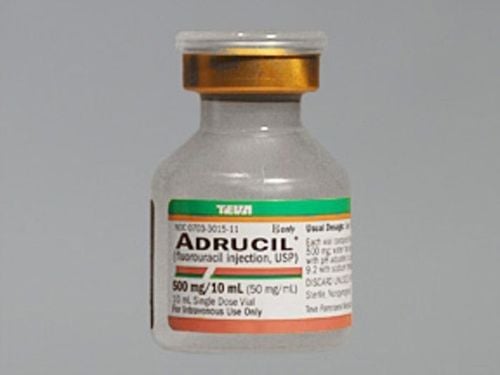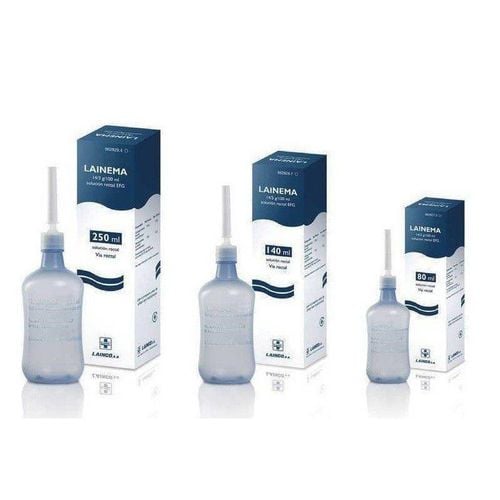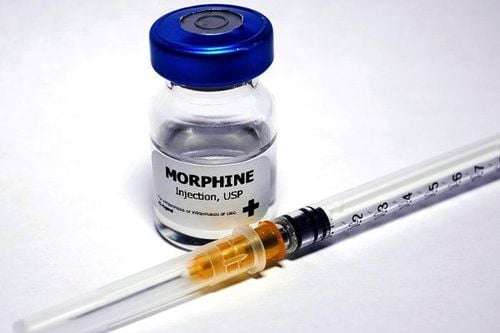This is an automatically translated article.
Colon cancer is a common digestive cancer in the world as well as in Vietnam. In 2020, Vietnam recorded 16,426 new cases of colorectal cancer and 8,524 deaths from this disease. The 5-year survival rate of patients with colorectal cancer detected at an early stage is up to 90%. Colon cancer screening helps to detect this disease early and effectively treat it, increasing the rate of patients getting cured.
1. Why screening for colon cancer?
Colon cancer screening is an important tool for finding and detecting cancer or precancerous lesions in people who do not show symptoms of the disease. Colon cancer screening allows detecting precancerous lesions, small cancerous lesions, not metastasized. Colon cancer screening is conducted in high-risk subjects for the following purposes:
Detecting colon cancer lesions at an early stage, helping to increase the likelihood of cure, reducing treatment costs, thereby reducing the risk of colon cancer. mortality rate, improving the quality of life for colon cancer patients. Detect precancerous lesions such as colorectal polyps and take action to treat these lesions before they become malignant.
2. Who should be screened for colon cancer
Colon cancer is associated with several risk factors. Based on these factors, people are divided into two groups of subjects who need to be screened for colon cancer:
2.1. High-risk groups for colon cancer People with one of the following factors are in the high-risk group for colon cancer:
People with a family history of colon cancer or colon polyps. People who have had colon cancer or colon polyps. People who have had Crohn's disease. People with a family history of genetic syndromes related to colon cancer such as hereditary adenomatous polyposis syndrome, Lynch syndrome, etc. People with a history of radiation therapy to the abdomen or pelvis due to previous cancer. These subjects need to be screened before age 45 with more sensitive and effective means, and at the same time, colon cancer screening is also more frequent.
2.2. People who do not have the above-mentioned high-risk factors are in the middle-risk group for colon cancer. These subjects should begin colon cancer screening at age 45.
People who are in good health and have an expected life expectancy of more than 10 years should continue to be screened for colon cancer until age 75. For people between the ages of 76 and 85, the decision to continue screening depends on the individual's wishes, general health and the results of previous screenings. People 85 years of age and older should stop getting screened for colon cancer.
3. Colon cancer tests used to screen for the disease
There are many screening tests for colon cancer. Each method has its own advantages and disadvantages. The choice of test depends on the specific subject and circumstances.
3.1. Total Colonoscopy Colonoscopy allows the entire lining of the colon to be examined. This indication is performed every 10 years for subjects who need to be screened.
The advantage of colonoscopy screening is that it can directly observe the entire colon, detect abnormalities in the colonic mucosa early such as inflammation, ulcers, polyps, tumors,... Colonoscopy. The colon also allows resection of polyps or biopsies of suspected colonic lesions.
However, total colonoscopy is limited in being able to miss small polyps. The preparation stage before colonoscopy also needs to rinse and clean the intestines. People who have a colonoscopy, if they have anesthesia, it will take longer because they need to rest after the colonoscopy. Besides, although the risk is very low, there are cases of colon bleeding, intestinal perforation or infection after colonoscopy.
3.2. sigmoidoscopy sigmoidoscopy is indicated to be performed every 5 years in some at-risk subjects, this is not a universal screening test. A sigmoidoscopy has the advantage of being quick to perform, and requires no pre-endoscopic preparation. The disadvantage of this method is that it cannot survey the entire colon; In addition, like total colonoscopy, sigmoidoscopy also carries a risk of bleeding, intestinal perforation or may miss small polyps.
3.3. Fecal occult blood test Early colon cancer often releases small amounts of blood and abnormal DNA in the stool. Fecal occult blood test should be performed annually in certain at-risk populations to screen for colon cancer
Fecal occult blood test is a cheap, simple, non-invasive test that does not cause damage up the colon. However, this test still exhibits limitations such as being able to miss cancerous or precancerous lesions such as polyps. The fecal occult blood test can give false positive results, if occult blood is found in the stool, it can't be concluded that colon cancer is present, so when detecting abnormalities, the patient should be examined. colonoscopy for examination.
3.4. Stool DNA test, Stool immunohistochemistry Test Stool DNA test is done every 3 years to look for DNA fragments of cancer cells or polyps that have been sloughed off and mixed in with the stool. Stool immunohistochemistry is performed annually to screen for colon cancer. These tests have the same advantages and disadvantages as fecal occult blood tests. Patients with abnormalities in stool DNA or stool immunohistochemistry also require colonoscopy to confirm the diagnosis.
3.5. Computed tomography of the colon - abdomen Computerized tomography of the colon is a non-invasive test that is usually performed every 5 years to screen for colon cancer for some at-risk subjects. In addition to detecting large tumors in the colon lumen, abdominal computed tomography also helps detect other abnormalities in the abdomen. In addition, computed tomography has the advantage of being quick and safe.
The disadvantage of computed tomography is that it is necessary to clean the colon (enema) before taking it to give a clear image and accurately assess the characteristics of the lesion (if any), the person is screened by this method. This method also receives a small amount of radiation. Computed tomography can also miss small lesions or polyps, on the other hand, this method does not allow polyp removal or biopsy of suspicious lesions.
4. Colon cancer screening plan for at-risk subjects
4.1. People at average risk of colon cancer People at average risk should begin screening for colon cancer at age 45. The recommended screening plan is as follows:
Colonoscopy every 10 years . Abdominal computed tomography every 5 years. Sigmoidoscopy every 5 years, possibly with stool testing. Annual occult blood/fecal test. DNA/fecal test every 3 years. 4.2. People at high risk for colon cancer High-risk people for colon cancer should get screened before age 45 with a more frequent screening plan and use of more sensitive, highly effective screening facilities. More specifically, as follows:
Family history of colorectal cancer or polyps: Screening is recommended depending on the relationship to the patient, the number of people in the family, and the age. at the time of their colon cancer detection. For example, people whose parents or siblings (first degree relationship) were diagnosed with colon cancer or polyps before age 60 should be screened for colonoscopy at 5 years. 1 time, starting at age 40 or before 10 years of age of the affected person in the family. People with 2 family members (first degree relationship) who are sick at any age are also eligible for this screening plan. For those who have 1 member in a first-degree relationship (father, mother, brother, sister, brother) diagnosed with cancer or colon polyps aged 60 years or older; or 2 or more members in a secondary relationship (grandfather, grandmother, uncle, aunt, aunt, etc.) are ill, they should start screening at the age of 40 by colonoscopy. Personal history of colorectal cancer: regular follow-up by colonoscopy in the first year, necessary additional tests such as ultrasound, computed tomography may be required. Personal history of colonic polypectomy: The time required for colonoscopy to check depends on the size, number, and type of polyps, but usually does not exceed 3 years. Personal history of inflammatory bowel disease (Crohn's disease): Screening for colon cancer should be started at least 8 years after being diagnosed with Crohn's disease, then depending on risk factors before that repeat endoscopy every 1-3 years. Family history of genetic syndromes in colorectal cancer: early screening with colonoscopy, possibly starting in adolescence, and more frequent screening is recommended. History of previous abdominal/pelvic radiation therapy: usually screening is done 5 years after radiotherapy, or from 30 years of age, the screening method of choice in these subjects is colonoscopy or stool test. , need to be re-tested every 3-5 years. In summary, colon cancer screening in high-risk subjects has great significance in early detection and effective treatment of colon malignancies, reducing the recurrence rate and mortality risk in these patients. sick person.
Please dial HOTLINE for more information or register for an appointment HERE. Download MyVinmec app to make appointments faster and to manage your bookings easily.













